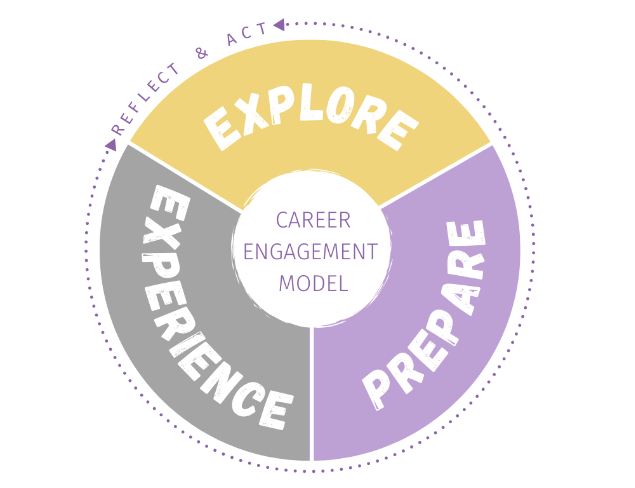Career Engagement Model
Career development is an ongoing process, and our Career Engagement Model can help individuals strategize and plan their course of action. The model was developed based on a career and development theories including Kolb’s Experiential Learning Theory, Super’s Lifespan Development and Concept of Self, and Krumboltz’s Happenstance Theory.
Below is an outline of action steps to help you individuals at any career stay to explore, prepare and gain experience all while continually reflecting and taking action to fully engage in the journey. Review the Graduate tab and Alumni tab at the top of the page for more tailor action steps for those populations. Many items are already integrated into academic and co-curricular experiences of current students. The Career Development Center is always able to discuss with campus partners, ways of incorporating career engagement into the classroom and student learning experience.

Reflection & Action
The foundation of a successful career is reflection. You will personally evolve based not just on career related experiences but all elements of life. The entire model is encircled in the need to reflect so that you can take any necessary action steps to maintain, change, or grow your career engagement.
Explore
Explore your options by developing an understanding of who you are and the goals you are working toward. Research career options by discovering your personal values, interests, and skills.
- Meet with a career counselor to learn about different careers and WCU majors
- Explore your Handshake account, which gives you access to internship, and job opportunities
- Research and join student organizations through RamConnect that relate to your interests
- Complete career assessments such as FOCUS and Strong
- Visit onetonline.org or ohh.gov to explore careers
- Share your interests and career ideas with your Academic Advisor
- Create an account on Ram Nation to connect with WCU alumni in your areas of interest
- Talk with professors and instructors to understand more about field-specific opportunities
Prepare
Prepare for opportunity by building your resume, cover letter, network, and interviewing strategies. These preparation pieces act as the foundation of a successful career journey and are elements that will continue with you throughout your entire process.
- Reflect on current or past jobs to identify your transferable skills to develop your resume and cover letters
- Upload your résumé to Handshake to be reviewed by Career Development staff
- Clean up your social media; update privacy settings social media presence to ensure it is employer-friendly
- Set up a LinkedIn account to begin developing your professional image and connect with 50 people
- Participate in a mock interview and practice utilizing STAR technique
- Develop your elevator pitch/ finalize your 1-minute commercial
- Recognize resources you may need for an interview: Appropriate interview attire, transportation, private space for virtual interview, etc.
- Research and become knowledgeable about a competitive salary range in your field
- Identify and confirm at least 3 individuals who are willing to serve as references
- Review graduate schools’ websites to ensure you understand required application materials & deadlines
Experience
Experience is putting into action your knowledge and skills while building new abilities and diversifying your engagement. This can take on many forms depending on what stage you are in on your path including employment, internships, and continued education.
- Search Handshake and Quad Jobs to look for a position that can help you gain important transferable skills
- Volunteer at organizations to help you learn more about your interests
- Serve as a student organization officer or leader to develop skills through meaningful participation
- Expand your network by staying active on LinkedIn and Ram Nation
- Engage in academic research through the university or externally
- Update your résumé with new experiences and/or relevant coursework
- Join professional associations or organizations in your career field and attend meetings and/or conferences
- Complete an internship; make sure to speak with your academic department if seeking credit
- Attend the Job & Internship Fair (one held each semester)
